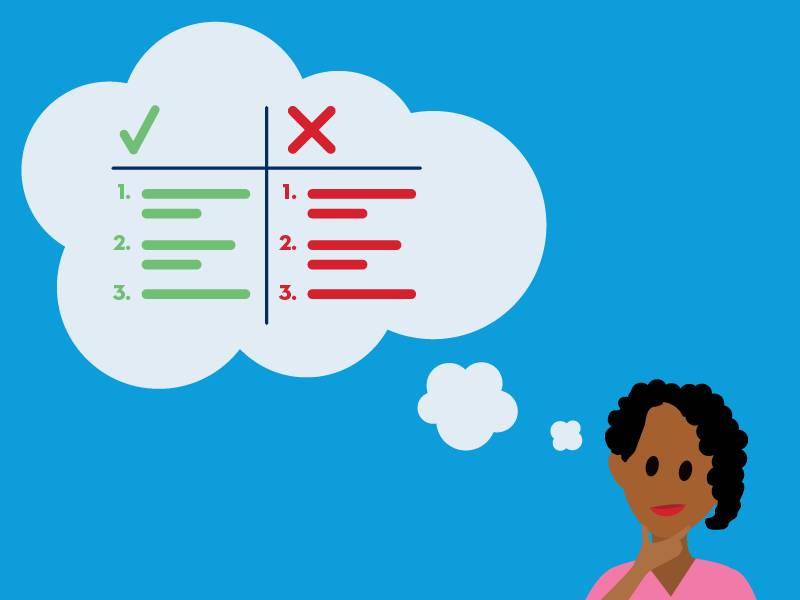Manage Emotional Reactions
Learning Objectives
After completing this unit, you’ll be able to:
- Explain self-management in the workplace.
- Explain the benefits of self-management.
- Take responsibility for your emotions and actions.
What Is Self-Management?
Self-management is a broad topic. It can refer to how you manage your health, finances, and so on. Here, we refer to self-management as how you manage your emotions in a positive way in the workplace.

Self-management is closely tied to self-awareness. After all, it’d be challenging to manage emotions if you’re unaware that you’re experiencing them.
Own How You Feel
Who is responsible for how you feel? The answer to this question is important and one of the most significant insights about self-management. The answer is also one of the most challenging, and some people have difficulty accepting it.
The answer: You are responsible for how you feel and no one else.
Separate Your Emotions from Those of Others
Taking responsibility for emotions is a skill, and it takes time to develop. Often, people blame others for how they feel.
Perhaps you've heard the term you message. For example, "You made me feel __________." Notice any you messages you encounter, either your own or someone else’s? When you do, remember that no one makes you feel anything. Your feelings belong to you. When these statements arise, give time to allow each side to take responsibility for their own emotions.
The same principle applies to situations—the situation itself didn’t make you feel one way or another. The feeling came from you and how you perceived the event.
Take Responsibility for Your Emotions
Self-management begins with taking responsibility for your own emotions and how you express them. There are typically numerous options available for expression.
Imagine you’re working on a big project with many team members. Your current task depends on someone else getting their task done, but they miss their deadline. You may feel frustrated, angry, or something else. What do you do?
- Do you call the person out in a public forum?
- Do you send a private message to the person to check in and offer help?
- Do you send a critical message to the person’s manager?
Remember the tips to “spit out the hook” that you read in the previous unit. Those tips can help guide your response. There are many ways to react, and your reaction belongs completely to you.
Know the Benefits of Self-Management
There are a host of areas that can be improved by taking responsibility for one’s own emotions and reacting in a way that’s positive. And making improvements in these areas can lead to better results at work.
| Self-Management Benefit |
Description |
|---|---|
|
Positive Stress Management |
Work successfully with stress and stressful situations. Retain the ability to think and make rational decisions, even under stress. Avoid mistakes that people usually make due to stressful situations. |
|
Skillful Problem Solving |
Handle challenges more efficiently. Retain the ability to analyze the situation, review problems, and find effective solutions, even in the toughest situations. Keeping your mind sober and calm allows you to make rational decisions. |
|
Inspiring Communication |
Share information with fewer mistakes and greater clarity, and find solutions more efficiently. Remember that listening is a more powerful communication skill than talking, and it’s a skill that is often lost in times of stress. |
|
Better Time Management |
Plan the days and weeks ahead with a refreshed outlook on your challenges. Time management improves as you become better at self-management. It also is a self-management technique in itself. Giving yourself time to stop and think about your work, for example, helps the rational part of your brain take over. |
|
Improved Health |
Reduce negative stress and its impact on your health by resolving challenging situations successfully. Health is another aspect that benefits from self-management as well as serves as a self-management technique. And healthy practices, like movement and mindfulness, give you more opportunities to reflect on and manage emotions. |
Organizations seek ways to be more productive. When it comes to emotional intelligence, increasing your skill of self-management will help you boost work output while improving relationships with others.
But how do you get better at self-management, exactly?
Develop Self-Management Skills
Self-management skills depend on the decisions you make, and how you choose to take responsibility for your actions.

Everyone reacts to situations differently. Say you’re talking with a coworker about a challenging and overwhelming project. Or imagine you’re in a job interview that might determine the course of your career. If you practice self-awareness in situations like these, pausing to think about your emotional reaction, you’re already taking a good first step in EI. And if you claim ownership and responsibility for your emotions, you’re taking an important next step.
Finally, it’s helpful to align your emotions and your response to key areas of responsibility.
- Initiative
- Organization
- Accountability
- Alignment
Next, we describe each key area. After that, we offer you an opportunity to reflect on how you can apply them in your work life. Reply to the prompts, or come up with your own prompt based on specific situations at your work. Click Print, then choose whether to save your reflection as a PDF or print out the response so you can refer back to it along your EI journey if you want.
Like the reflection exercise earlier in this module, we do not save your answers, and you don’t have to complete these exercises to earn this badge. They are helpful moments to pause, reflect, and apply the EI practices you’ve learned thus far.
Initiative
Initiative is being able to work without needing to be told what to do. Show initiative by thinking for yourself and taking action when needed. This means thinking about a solution and taking steps to achieve it. Initiative requires self-belief, because you need resilience and motivation to go out of your way to solve problems or do things without being reminded or asked. It’s OK to check in with your manager to discuss your ideas and proposed steps. The important part is that you are coming up with your own ideas and are taking the initiative to implement them.
Organization
If you’re organized at work, you plan your time and the things you have to do. You know what’s most important and what takes the longest time to accomplish. You’re prepared and have the things you need when you need them. So if you know you need certain tools or information to complete a task, make sure you have them before you begin.
Accountability
Accountability and responsibility are similar, but they don’t mean the same thing. Accountability is your willingness to accept responsibility. Your manager could give you responsibility for a task, but you could still look for someone else to blame if it goes wrong. Or you could decide not to put the effort in because you don’t really care about the results. Successful people tend to be known for a willingness to accept responsibility for their actions and the actions of those they lead.
Alignment
Alignment refers to how roles and teams at work are arranged. Ask yourself: Is your job description aligned with your skills? Do you understand and agree with what is expected of you? Is your work tied to the goals of the organization? Are your personal mission and values aligned with the organization? If you notice that your skills are underutilized, you can collaborate with your manager to better align your skills with the work that needs to be done. Perhaps you're well aligned one year, and in the next you need to make adjustments.
Sum It Up
In this module, you learned about self-awareness and self-management—two essential parts of emotional intelligence. While work can sometimes pressure us to just get the job done, we should pause and reflect on how we’re feeling in a specific situation, and take responsibility for how we act.
Want to Learn More?
This module and the next module in this trail were developed in collaboration with Arizona State University to introduce you to the elements of emotional intelligence. If you want to learn more, explore Arizona State University’s online course on emotional intelligence.